
As the physician shortage grows, so does the demand for locum tenens services. Two surveys, commissioned by CHG Healthcare and conducted by Hanover Research, polled physicians on locums. We found that physicians in locums have generally positive experiences, in part due to increased earning potential, schedule flexibility, and a desire for better work/life balance.
Interest in locums work among physicians
Similarly, as demand for locum tenens increases, the level of awareness and interest among physicians also builds. While in 2019, 53% of physicians were highly familiar with locums, a 2023 survey showed that now two-thirds (67%) of all physicians are highly familiar with locums. The surveys also indicated that in the same period, 19% (up from 9%) of physicians were highly interested in working locum tenens.
Familiarity with and interest in working locum tenens
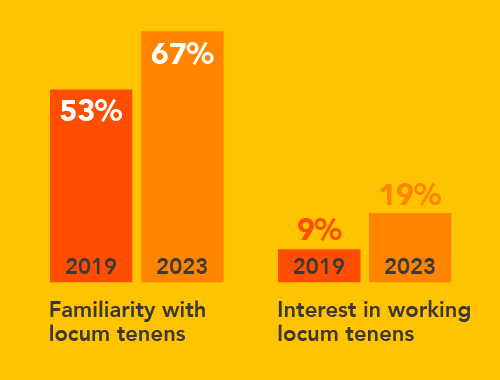
Nearly half (49%) of surveyed physicians with current or past locums experience learned about locums while job seeking. Word of mouth and personal/professional connections were also an important catalyst: 42% of physicians surveyed learned about locums from other healthcare professionals, and 40% pointed to friends or colleagues who work locum tenens.
Most (70%) physicians also have a favorable impression of locums; notably, 81% of current or former locum physicians reported a positive experience working locums.
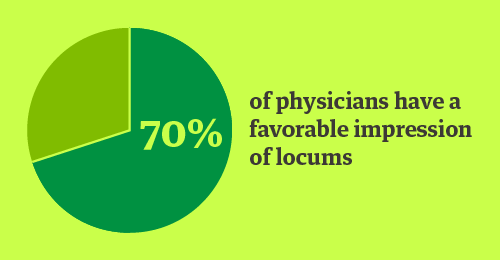
How many physicians work locum tenens?
An estimated 7% of physicians (about 52,000) currently work locum tenens, a rate consistent with 2022’s numbers and a 6% increase from 2021.
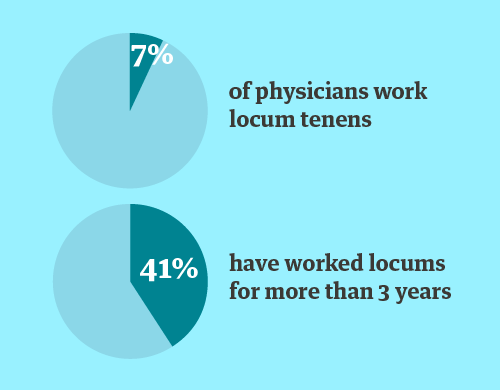
Among physicians currently working in locums, nearly half (41%) have worked in locums for more than four years. Most doctors with locum tenens experience took their first assignment within 10 years of completing their training (60%).
Where do physicians work locum tenens?
Locum physicians worked in a variety of environments — 40% in suburban areas, 36% in rural areas, and 26% in urban areas.
Where physicians report working locum tenens assignments
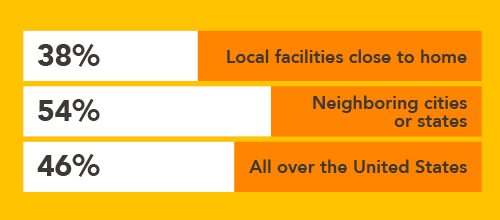
Likewise, there is a broad mix of where they work in relation to their homes: 38% work in local facilities close to where they live, 54% work in neighboring cities or states, and 46% take assignments anywhere in the United States.
Despite strong interest in practicing abroad, just 3% of locum physicians reported working locum tenens in international locations. Many physicians surveyed expressed some level of interest in working internationally (81%), and 55% said the opportunity to travel and see the world is an attractive benefit. However, barriers such as family obligations (59%) and longer time commitments (49%) discourage many from taking international assignments.
Why do physicians work locum tenens?
Locum tenens work offers physicians greater autonomy over their schedules and/or finances. In fact, 40% of surveyed locum physicians cite autonomy and flexibility as the primary reason for doing locums. Additional compelling factors were supplemental income (37%) and appealing salary (30%).
Top three reasons physicians choose to work locum tenens
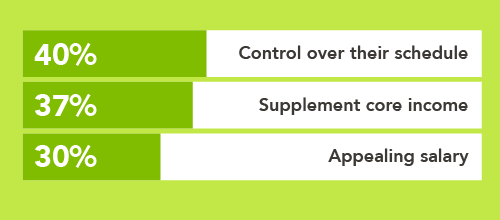
The reasons doctors continue to work locum tenens are similar to those that initially attracted them: control over their schedules (49%), appealing salary (38%), and supplemental income (34%).
More than half of locum physicians work locums in addition to another job, including full-time employment (45%) or private practice (13%). Forty-two percent of the physicians surveyed say they work locums exclusively.
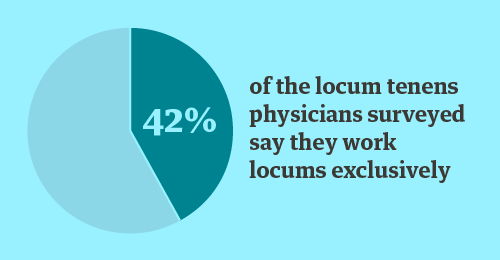
The survey also uncovered some differences related to specialty. Psychiatrists and family medicine doctors are more likely to work locum tenens exclusively than those of other specialties. On the opposite end of the spectrum, emergency medicine physicians and cardiologists are more likely to work locum tenens in addition to other employment.
How age, gender, and marital status affect the reasons for working locum tenens
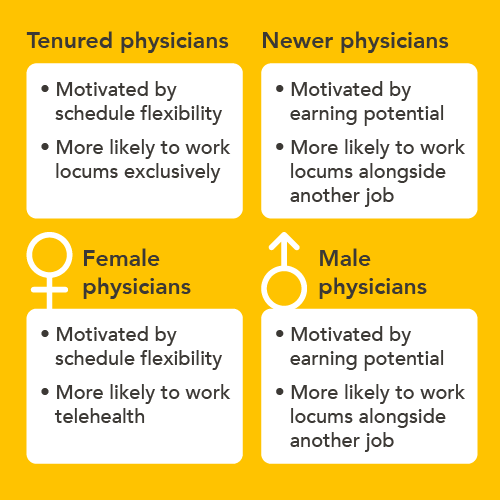
Older and/or more tenured physicians are likelier to work locum tenens exclusively and are less motivated by earning potential. Tenured physicians often use locums as a bridge toward retirement and generally have positive experiences with locums. Most say they plan to continue working locums assignments in the future.
Conversely, younger and/or less tenured physicians are often more motivated by earning potential, prioritizing financial gains to help pay off debt, and achieving a desired standard of living. Younger physicians are also more likely to work locums in addition to a full-time position to supplement their income.
When it comes to gender, female physicians tend to prioritize autonomy and flexible schedules more than their male peers. Female physicians are also more interested in non-traditional locum settings, such as telehealth. Meanwhile, male physicians generally pursue locums to make financial gains and use locums as a supplement to their full-time salaries.
Married physicians tend to value financial gains more than their unmarried peers and are more likely to work locums for supplemental income in addition to their full-time employment. Conversely, unmarried physicians appear to value autonomy and work exclusively as locums for more control over their schedules.
Physicians' outlook on locums
The studies found that most physicians currently working locums are likely to continue in some capacity. More than three-quarters (79%) of current locums physicians are highly likely to continue working locums assignments, and 41% percent of physicians who previously worked locums are interested in working locums assignments again in the future.
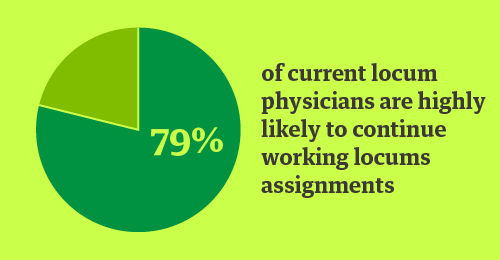
For physicians who stop working locums, the most frequently cited reason is securing full-time employment (52%). Other common reasons for leaving locums include a preference for the consistency of full-time work (23%) and family obligations (20%).
And although burnout has the potential to impact any healthcare provider — full-time or locum —relatively few (5%) of locum physicians surveyed reported feelings of extreme burnout. Encouragingly, 56% reported experiencing burnout relief when making the switch to locums.
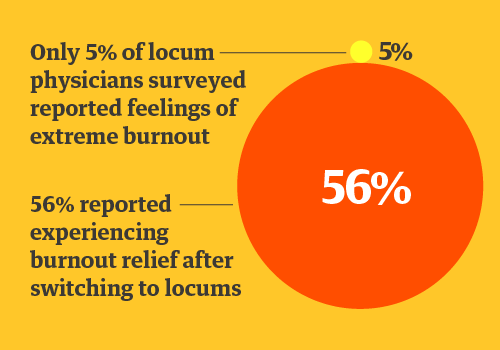
Methodology:
Hanover Research, in collaboration with CHG Healthcare, polled more than 700 physicians working locum tenens in the United States for insight into their experience. Physicians who responded to the survey represented a wide variety of ages, locations, and specialties. We also drew additional data from past CHG Healthcare surveys, also conducted by Hanover Research, with survey results from over 1,000 physicians on their overall awareness and perception of locum tenens.